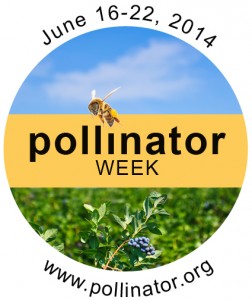The week of June 16 – 24, 2014 is National Pollinator Week, a campaign to increase public understanding of the importance of pollinators to agriculture and the environment.

What is a pollinator? Pollinators are animals that help plants reproduce. Most people think of honeybees, but pollinators include many other species such as butterflies, moths, ants, beetles, and hummingbirds. Pollinators visit flowers in search of food (pollen or nectar) and pickup pollen on their bodies. Then they transfer the male pollen to the female part of a flower, resulting in the formation of a fruit or seed.
Why are pollinators important? Pollinators help pollinate over 75% of flowering plants and nearly 75% of crops worldwide. In the U.S. alone, bees undertake the astounding task of pollinating nearly $20 billion in crop value, particularly for specialty crops such as nuts, berries, fruits, and vegetables. Do you like your morning coffee, a chocolate bar, or wearing cotton clothing? None of these would be possible without pollinators. And these pollinators do their work for free! The vital services pollinators provide do not come without a responsibility on our part. Natural habitats are being lost as development encroaches on forests and meadows. Most pesticides are “non-selective,” which means they kill good insects along with the bad. Recent studies say that a combination of factors threaten pollinators – pesticides, genetic inbreeding of domesticated honeybees, poor diet, and parasites.
Go to Do for Pollinators: There are lots of things we all can do to make sure pollinators keep up their good work.
- Create a pollinator-friendly yard. Flowering plants that supply pollinators with nectar, pollen, and homes are critical for pollinators. The Outer Coastal Plan Planting Guide will tell you what pollinator-friendly plants work best in Hampton Roads.
- Avoid the use of pesticides. The Beekeepers Guild of Southeast Virginia recommends this organic recipe in place of pesticide for use on vegetables, ornamentals, and herbs:
- Mix 1 tablespoon of mild, non-bacterial dish soap (such as Ivory) with 1 cup cooking oil, such as safflower, soybean, or peanut.
- Store this concentrated solution for use throughout the gardening season.
- When needed, mix 4 teaspoons of this concentrate in 2 cups of water and pour into a pump sprayer or spray bottle.
- Spray plants thoroughly when daytime temperatures are below 85 degrees.
- If you use pesticide, do it responsibly. Read the label before purchasing and pick a product that is not toxic to bees. Do not apply pesticides to flowering plants. Apply pesticides in the evening when many pollinators are not active.
- Save the nests. If bee or wasp nests are in a troublesome location, don’t destroy them. Honeybee nests or swarms can be safely removed by local bee-keepers.
Blog post contributed by Karen Mayne. Karen is a biologist retired from the U.S. Fish and Wildlife Service who resides in Norfolk and enjoys writing about environmental issues.